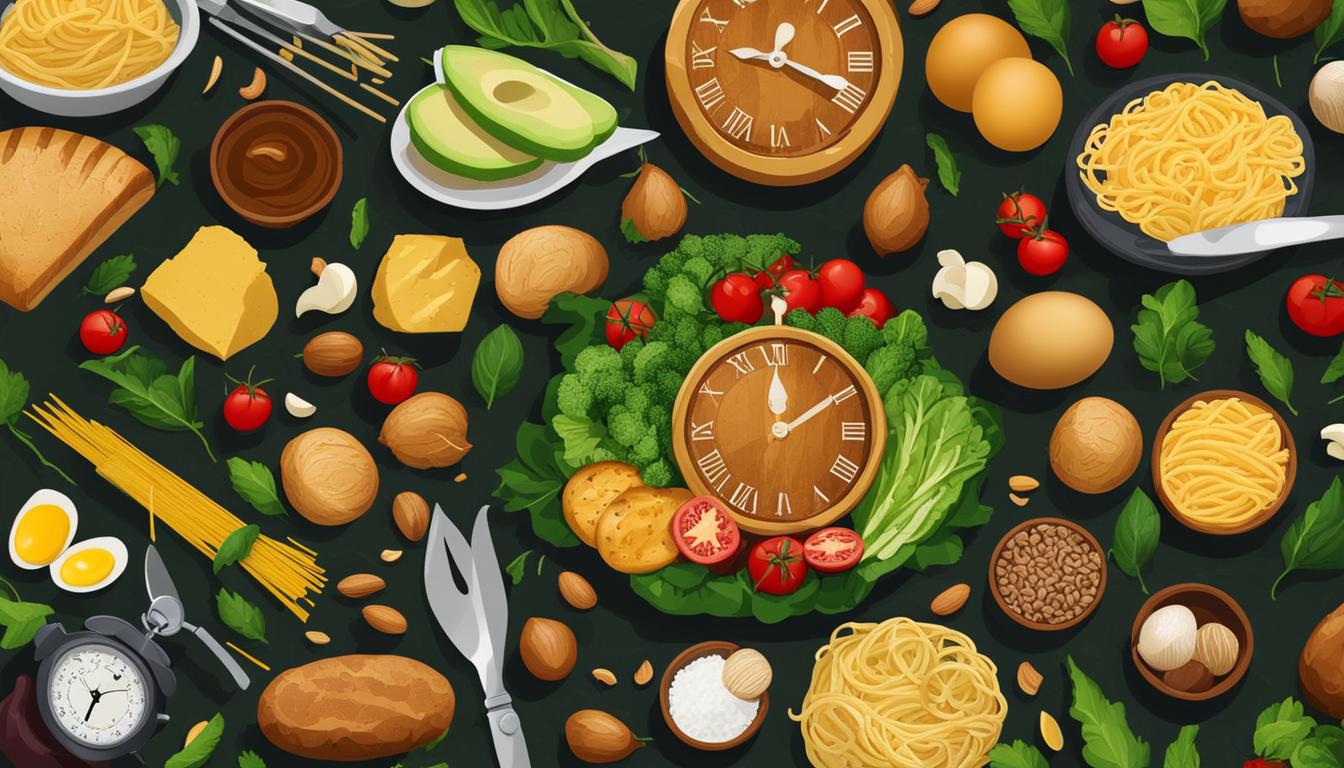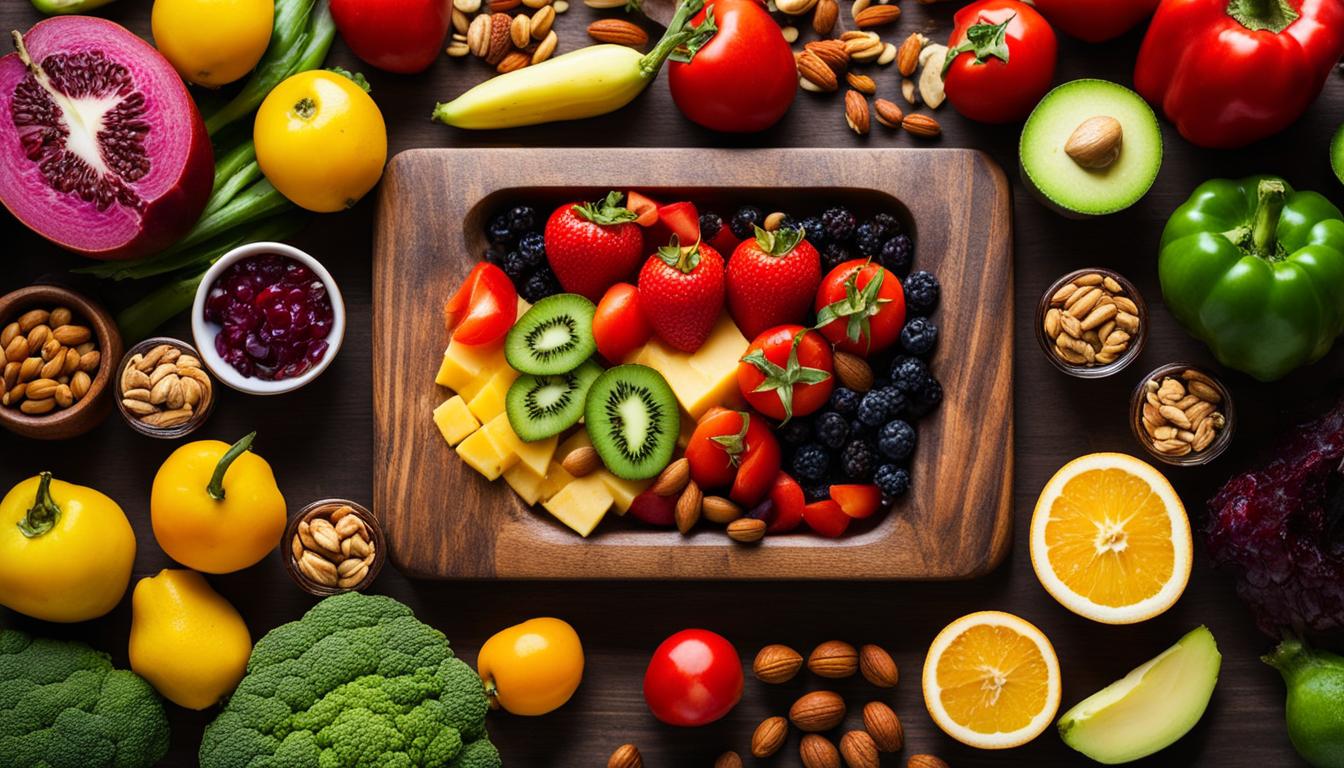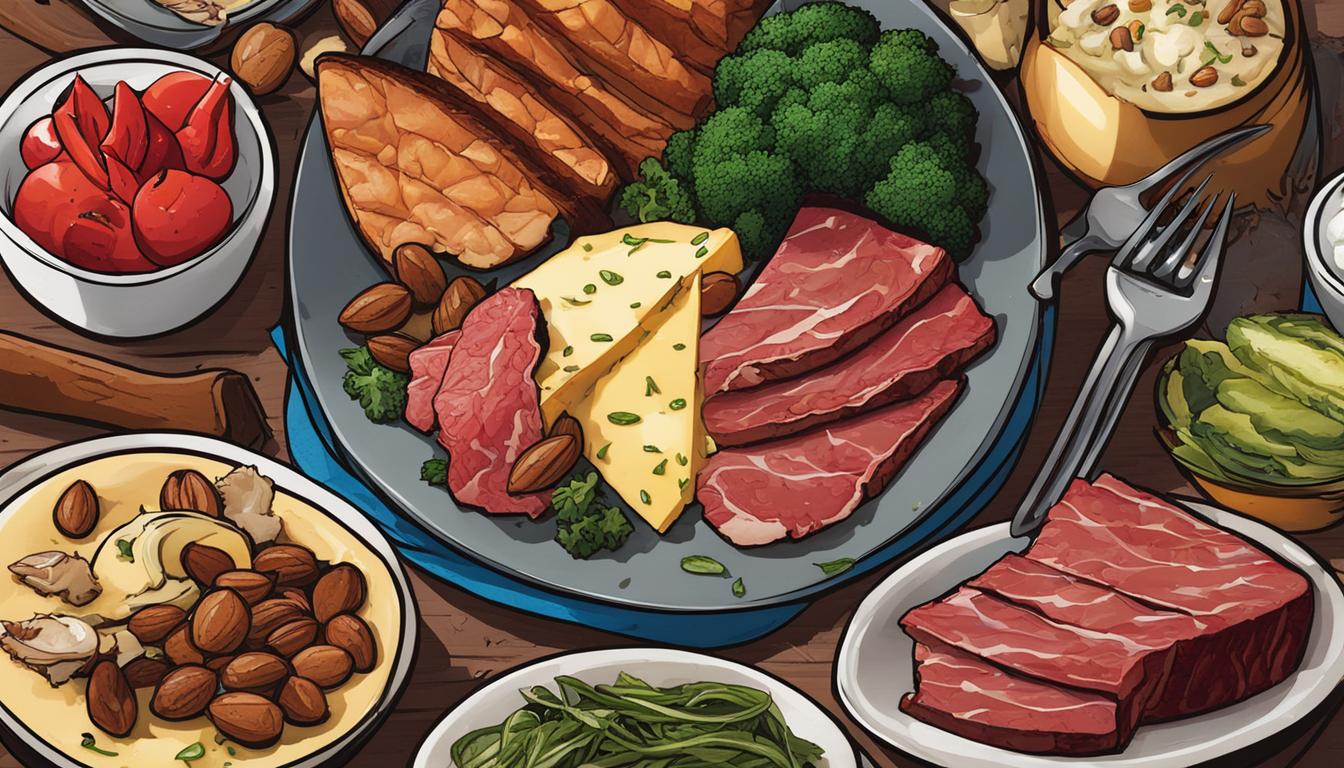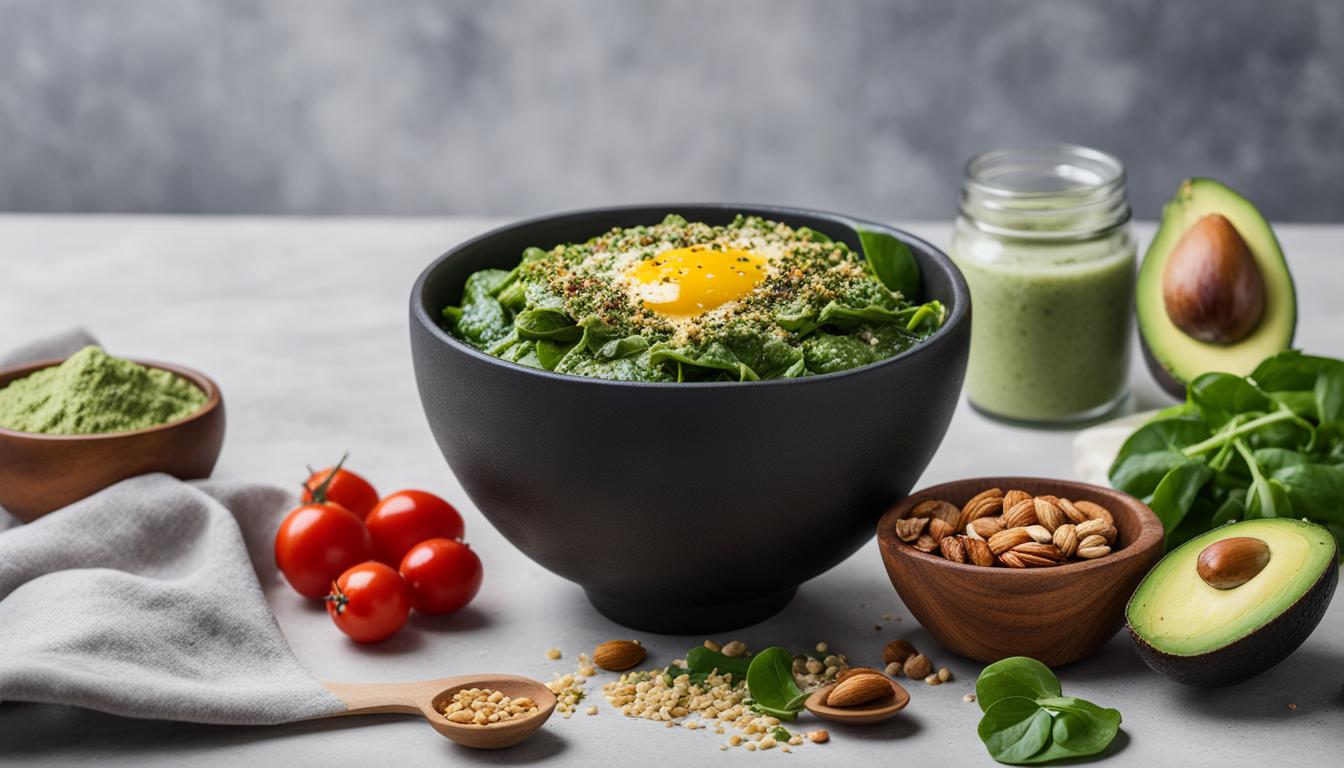Are you looking for an effective way to promote weight loss and stabilize your blood sugar levels? A low carb and fat diet may be the answer you’ve been searching for. By limiting your intake of carbohydrates and focusing on high-quality fats, you can experience numerous health benefits. Let’s explore the essentials of a low carb and fat diet and how it can improve your overall well-being.
Key Takeaways:
- Low carb and fat diets can contribute to weight loss and better blood sugar control.
- There are different types of low carb diets, such as the ketogenic diet, Atkins diet, South Beach diet, and Paleo diet.
- On a low carb diet, you can enjoy foods like meat, fish, eggs, non-starchy vegetables, lower carb fruits, nuts and seeds, high-fat dairy, and healthy fats and oils.
- Moderate carb foods, such as starchy vegetables and certain fruits, can be included in moderation.
- Avoid foods high in carbs, including sweet snacks, refined grains, low fat products, highly processed foods, and sugar-sweetened beverages.
Types of Low Carb Diets
Low carb diets come in different forms. Each one offers a unique approach to reducing carbohydrate intake and promoting weight loss. Here are four popular low carb diets:
Ketogenic Diet
The ketogenic (keto) diet is a low carb, high fat eating pattern that can help your body enter a state of ketosis. This diet typically restricts daily carb intake to less than 5-10% of total calories. By drastically reducing carbs, your body turns to fat as its primary source of fuel, leading to weight loss. Healthy fats like avocados, nuts, and olive oil are encouraged on the keto diet, along with moderate protein intake.
Atkins Diet
The Atkins diet is divided into four phases, with the initial phase being the most restrictive. This low carb diet limits carb intake to about 20 grams per day during the initial phase and gradually increases it over time. It focuses on lean protein, vegetables, and healthy fats. The Atkins diet aims to reprogram your body to burn fat for energy, resulting in weight loss.
South Beach Diet
The South Beach diet is a low carb eating plan that emphasizes healthy fats, lean proteins, and complex carbohydrates. It focuses on reducing carb intake, especially refined carbs and added sugars. The diet encourages the consumption of lean meats, fish, eggs, vegetables, and heart-healthy fats like olive oil and avocados. The South Beach diet aims to stabilize blood sugar levels and promote weight loss.
Paleo Diet
The Paleo diet, also known as the caveman diet, mimics the eating patterns of our ancestors. This diet is naturally low in carbs and encourages the consumption of whole foods, including grass-fed meats, fish, eggs, fruits, vegetables, nuts, and seeds. It excludes processed foods, grains, legumes, and dairy products. The Paleo diet focuses on nutrient-dense foods and can be an effective way to reduce carb intake and promote weight loss.
When choosing a low carb diet, it’s essential to consider your personal preferences and health goals. Each diet has its own guidelines and restrictions, so find one that aligns with your lifestyle and can be sustained in the long term.
Foods to Eat on a Low Carb Diet
When following a low carb diet, it’s essential to focus on consuming foods that are low in carbs but high in nutrients. These foods will provide you with the necessary energy and nutrients while keeping your carb intake low. Here’s a list of foods you can enjoy on a low carb diet:
Meats
Include a variety of meats in your low carb diet such as beef, lamb, pork, and poultry (chicken, turkey). These protein-rich options are not only low in carbs but also contain essential nutrients like iron and B vitamins.
Fish
Fish, particularly fatty fish like salmon, trout, haddock, and tuna, are excellent choices for a low carb diet. These fish are not only low in carbs but also rich in omega-3 fatty acids, which have been shown to offer numerous health benefits.
Eggs
Eggs are a versatile and nutritious food to include in your low carb diet. They are low in carbs and high in protein, making them a satisfying choice. Plus, eggs are an excellent source of choline and other essential nutrients.
Non-Starchy Vegetables
Fill your plate with non-starchy vegetables like spinach, broccoli, cauliflower, kale, and zucchini. These vegetables are low in carbs and high in fiber, vitamins, and minerals. They provide essential nutrients while keeping your carb intake in check.
Lower Carb Fruits
Opt for lower carb fruits like oranges, blueberries, and strawberries when you’re craving something sweet. These fruits offer a flavorful and nutritious addition to your low carb diet, providing essential vitamins and antioxidants.
Nuts and Seeds
Include nuts and seeds like almonds, walnuts, and sunflower seeds for a crunchy and satisfying snack. They are low in carbs and rich in healthy fats, protein, and fiber. These nutrient-dense foods are perfect for a low carb diet.
High-Fat Dairy
Add high-fat dairy products like cheese, butter, and heavy cream to your low carb diet. These dairy options are low in carbs and provide a good source of calcium, vitamin D, and healthy fats. Just make sure to choose full-fat options while limiting your intake based on your individual dietary needs and preferences.
Fats and Oils
Incorporate healthy fats and oils into your low carb diet, such as avocado, olive oil, and coconut oil. These fats not only add flavor to your meals but also provide essential fatty acids and fat-soluble vitamins.
By including these foods in your low carb diet, you can enjoy a wide range of delicious and nutritious options while keeping your carb intake low. Experiment with different recipes and combinations to create satisfying meals that align with your dietary goals.
Moderate Carb Foods to Include in Moderation
While following a low carb diet, it’s important to find a balance between restriction and enjoyment. Including some moderate carb foods in moderation can help add variety to your meals and make the diet more sustainable in the long run. Here are some examples of moderate carb foods that you can enjoy in moderation:
Starchy Vegetables:
Starchy vegetables such as potatoes and sweet potatoes contain a higher amount of carbohydrates compared to non-starchy vegetables. Including small portions of starchy vegetables in your meals can add flavor and texture. Just be mindful of the portion sizes to stay within your daily carb allowance.
Higher-Carb Fruits:
When it comes to fruits, some varieties are higher in carbs compared to others. Fruits like bananas and pineapples contain more carbohydrates than berries or citrus fruits. While they provide essential vitamins and minerals, it’s important to enjoy these higher-carb fruits in moderation to keep your carb intake in check.
Whole Grains:
Whole grains like brown rice, oats, and quinoa are a source of fiber, vitamins, and minerals. They also contain a moderate amount of carbohydrates. Including small servings of whole grains in your meals can provide added nutrients and make your low carb diet more balanced.
Legumes:
Legumes, including lentils, beans, and chickpeas, are a good source of plant-based protein, fiber, and carbohydrates. While they are higher in carbs compared to other sources of protein, consuming legumes in moderation can provide a nutritious and satisfying addition to your meals.
Higher-Carb Dairy:
Dairy products such as milk and yogurt contain lactose, a natural sugar found in milk. While they are higher in carbs compared to other dairy options, including small amounts of higher-carb dairy in your diet can provide important nutrients like calcium and protein. Opt for full-fat or low-carb options whenever possible.
Remember, the key is moderation. By including these moderate carb foods in controlled portions, you can still enjoy their benefits while staying on track with your low carb diet.
| Food Group | Examples |
|---|---|
| Starchy Vegetables | Potatoes, Sweet Potatoes |
| Higher-Carb Fruits | Bananas, Pineapples |
| Whole Grains | Brown Rice, Oats, Quinoa |
| Legumes | Lentils, Beans, Chickpeas |
| Higher-Carb Dairy | Milk, Yogurt |
Foods to Avoid on a Low Carb Diet
To effectively follow a low carb diet and achieve your health goals, it’s important to be aware of the foods to avoid. By steering clear of these items, you can stay on track and maintain a low carb intake.
Avoid Sweet Snacks
Sweet snacks are usually high in carbs and can sabotage your low carb diet. Popular sweet treats to avoid include candy, ice cream, and baked goods like cakes, cookies, and pastries.
Say No to Refined Grains
Refined grains are processed carbohydrates that have been stripped of their fiber and nutrients. These can raise blood sugar levels and hinder your low carb efforts. Stay away from white rice, white pasta, and tortillas made from refined flour.
Avoid Low Fat Products
Low fat products may seem like a healthy choice, but they often contain added sugars to compensate for the reduced fat content. These added sugars can quickly add up and derail your low carb diet. Read labels carefully and avoid low fat products with hidden sugars.
Stay Away from Highly Processed Foods
Highly processed foods are typically loaded with carbs and unhealthy additives. These convenience meals, fast food items, and packaged snacks can be tempting, but they are not conducive to a low carb lifestyle. Opt for whole, unprocessed foods instead.
Avoid Sugar-Sweetened Beverages
Sugar-sweetened beverages are packed with carbs and can quickly spike blood sugar levels. Avoid soda, sweet tea, sports drinks, and other sugary drinks. Instead, opt for water, unsweetened tea, or naturally flavored water.
Tip: Checking food labels can help you identify carb-rich foods to avoid. Pay attention to the total carbohydrate content, especially sugars and refined grains.
By avoiding these carb-rich foods and beverages, you can successfully maintain a low carb diet and reap the benefits of improved health and weight management.

| Foods to Avoid on a Low Carb Diet | Reason to Avoid |
|---|---|
| Sweet snacks (candy, ice cream, baked goods) | High carb content with added sugars |
| Refined grains (white rice, white pasta, tortillas) | Processed carbohydrates with minimal nutrients |
| Low fat products that contain added sugar | Hidden sugars to compensate for reduced fat |
| Highly processed foods (convenience meals, fast food, cookies) | Carb-rich and loaded with unhealthy additives |
| Sugar-sweetened beverages (soda, sweet tea, sports drinks) | High carb content and blood sugar spikes |
Sample Low Carb Meal Plan
Following a low carb meal plan can help you stay on track and make healthier food choices. Here’s a sample menu for 3 days on a low carb diet plan:
| Day 1 | Day 2 | Day 3 |
|---|---|---|
|
|
|
This sample low carb meal plan includes a variety of nutrient-dense foods that are low in carbs but high in flavor. Remember to adjust portion sizes and ingredients based on your specific dietary needs and preferences. Consult with a healthcare professional or registered dietitian for personalized guidance.
Tips for Success:
- Meal prep in advance to save time and ensure you have healthy low carb options readily available.
- Incorporate plenty of non-starchy vegetables to add fiber, vitamins, and minerals to your meals.
- Stay hydrated by drinking water throughout the day.
- Choose higher-quality fats like olive oil, avocados, and nuts for added flavor and satiety.
- Listen to your body’s hunger and fullness cues to avoid overeating.
By following a low carb meal plan and making mindful food choices, you can support your weight loss goals and improve your overall health. Remember to consult with a healthcare professional or registered dietitian before starting any new diet plan.
Healthy Low Carb Snacks
When following a low carb diet, it’s important to have healthy snack options on hand to satisfy cravings and stay on track. Here are some delicious and nutritious low carb snacks to enjoy:
- Piece of Fruit: A small serving of berries or a slice of apple can provide a refreshing and naturally sweet snack that is low in carbs and high in fiber.
- Greek Yogurt: Opt for plain, full-fat Greek yogurt as a creamy and protein-packed snack. Enjoy it on its own or add some nuts or berries for extra flavor.
- Hard-Boiled Eggs: Hard-boiled eggs are protein-rich and portable, making them an ideal low carb snack. Season with salt, pepper, or your favorite spices for added taste.
- Baby Carrots: Munch on crunchy baby carrots for a low carb snack that’s packed with vitamins and fiber. Pair them with your favorite low carb dip for added flavor.
- Leftovers from Previous Meals: Repurpose leftovers from your low carb meals as a convenient snack option. Simply heat them up or enjoy them cold for a satisfying and easy snack.
- Handful of Nuts: Almonds, walnuts, and pecans are nutritious and satisfying low carb snacks. They provide a good source of healthy fats and can help keep you full between meals.
- Cheese and Meat: Create a delicious charcuterie-style snack by pairing sliced cheese with your favorite low carb deli meat. This snack is rich in protein and flavor.
These snacks offer a balance of nutrients and are low in carbs, making them perfect for supporting your low carb journey. Enjoy them whenever you need a quick and satisfying bite to keep you going.

Eating at Restaurants on a Low Carb Diet
Following a low carb diet doesn’t mean you can’t enjoy eating out at restaurants. With a few smart choices and some awareness, you can stay on track with your low carb lifestyle while still savoring delicious meals. Here are some helpful tips for dining out on a low carb diet:
- Opt for meat or fish-based main dishes: Choose options like grilled chicken, steak, fish, or seafood. These protein-rich choices are typically lower in carbs and can be paired with non-starchy vegetables for a satisfying meal.
- Choose plain water instead of sugary drinks: Skip the soda, fruit juices, or sweetened beverages. Instead, opt for water with lemon or unsweetened iced tea to keep your carb intake low and stay hydrated.
- Add extra vegetables or a side salad instead of starchy sides: Swap out items like mashed potatoes or fries for extra veggies, a side salad, or steamed greens. This way, you can still enjoy a filling meal while avoiding excessive carbs.
- Check menus beforehand for low carb options: Many restaurants now provide nutritional information or special menus for those adhering to low carb diets. Take advantage of these resources, and plan ahead by choosing restaurants with low carb options available.
- Ask for sauces on the side to control portion sizes: Sauces, dressings, and condiments can sneak in extra carbs. Request them on the side so you can control the amount you use, or choose options that are lower in sugar and carbs.
- Consider taking leftovers home to reduce carb intake: Portion sizes at restaurants can often be larger than necessary. Don’t hesitate to ask for a to-go box and save leftovers for another meal. This can help you avoid overeating and reduce your carb intake.
By following these tips, you can enjoy eating out while maintaining your low carb lifestyle. Remember to make choices that align with your goals and preferences, and don’t be afraid to ask your server for assistance or modifications to suit your dietary needs.
Who Should Follow a High-Fat, Low-Carb Diet?
A high-fat, low-carb diet, such as the keto diet, can be beneficial for individuals looking to lose fat and control their weight through diet and exercise. This eating pattern focuses on consuming foods rich in healthy fats while minimizing carbohydrates. The goal is to put your body into a state of ketosis, where it burns fat for fuel instead of relying on carbohydrates.
The high-fat, low-carb diet is particularly popular among those seeking rapid weight loss and improved body composition. By reducing carbohydrate intake and replacing it with healthy fats, individuals may experience increased satiety and reduced cravings, leading to a reduction in overall calorie intake.
This eating approach may also be helpful for people with specific health conditions. For example, research shows that a high-fat, low-carb diet can be effective in managing epilepsy in some individuals, particularly children. It may also benefit those with type 2 diabetes by improving blood sugar control and reducing insulin resistance.
However, it’s crucial to consult with a healthcare professional before starting any diet, especially if you have underlying health conditions. They can provide personalized guidance and ensure that this eating approach is suitable for your individual needs and goals.
“The high-fat, low-carb diet is a popular choice for weight loss and may have additional benefits for people with specific health conditions.”
Who Should Avoid a High-Fat, Low-Carb Diet?
While a high-fat, low-carb diet may be beneficial for many, there are some individuals who should exercise caution or avoid this eating approach. These include:
- People with certain medical conditions: Individuals with pancreatic or liver disease, gallbladder issues, or a history of heart disease should consult with a healthcare professional before starting a high-fat, low-carb diet.
- Pregnant or breastfeeding women: The nutritional needs of pregnant and breastfeeding women differ from those of the general population. It’s essential to follow appropriate dietary guidelines during these stages of life.
- Those with a history of disordered eating: The restrictive nature of a high-fat, low-carb diet may not be suitable for individuals with a history of disordered eating habits, as it can potentially trigger or exacerbate unhealthy eating patterns.
Always prioritize your health and well-being above any specific diet. Consulting with a healthcare professional is crucial before making any significant changes to your eating habits.
Summary
A high-fat, low-carb diet, such as the keto diet, can be an effective approach for weight loss and managing certain health conditions. It involves consuming foods high in healthy fats while minimizing carbohydrate intake. This eating pattern may benefit individuals looking to lose fat, control their weight, or manage conditions such as epilepsy or type 2 diabetes. However, it’s essential to consult with a healthcare professional before starting any diet, especially if you have underlying health conditions or specific dietary requirements.
Conclusion
In summary, following a low carb and fat diet can have numerous health benefits, including weight loss and improved blood sugar control. By prioritizing low carb foods, high-quality fats, and nutrient-dense options, you can support your overall well-being. It’s crucial to choose a low carb eating pattern that suits your preferences and health goals.
Remember, before making any significant dietary changes, it’s essential to consult with a healthcare professional. They can provide personalized guidance and ensure that a low carb and fat diet is suitable for your individual needs.
Embrace the power of a low carb and fat diet to enhance your health and achieve your wellness goals. Start incorporating these principles into your lifestyle and enjoy the benefits of better weight management and blood sugar stability.
FAQ
What is a low carb and fat diet?
A low carb and fat diet is a dietary approach that restricts carbohydrates while focusing on foods high in healthy fats. This type of diet can promote weight loss and stabilize blood sugar levels.
What are the different types of low carb diets?
There are several types of low carb diets, including the ketogenic (keto) diet, Atkins diet, South Beach diet, and Paleo diet. These diets differ in the amount of carbs permitted per day and the types of foods allowed.
What foods should I eat on a low carb diet?
On a low carb diet, you can eat foods such as meat, fish, eggs, non-starchy vegetables, lower carb fruits, nuts and seeds, high-fat dairy, and healthy fats and oils.
Can I include moderate carb foods in my low carb diet?
Yes, you can include some moderate carb foods in moderation, such as starchy vegetables, higher-carb fruits, whole grains, legumes, and higher-carb dairy. It’s important to limit portion sizes.
What foods should I avoid on a low carb diet?
You should avoid sweet snacks, refined grains, low fat products that contain added sugar, highly processed foods, and sugar-sweetened beverages on a low carb diet.
Can you provide a sample low carb meal plan?
Here’s a sample menu for 3 days on a low carb diet plan:
What are some healthy low carb snacks?
Healthy low carb snacks include a piece of fruit, Greek yogurt, hard-boiled eggs, baby carrots, leftovers from previous meals, a handful of nuts, or cheese and meat.
How can I navigate eating at restaurants on a low carb diet?
When dining out, opt for meat or fish-based main dishes, choose plain water instead of sugary drinks, add extra vegetables or a side salad instead of starchy sides, check menus for low carb options, ask for sauces on the side, and consider taking leftovers home to reduce carb intake.
Who should follow a high-fat, low-carb diet?
A high-fat, low-carb diet, such as the keto diet, can be beneficial for individuals looking to lose fat and control their weight through diet and exercise. It can also be helpful for people with specific health conditions, such as epilepsy or type 2 diabetes.
What are the key points of a low carb and fat diet?
The key points of a low carb and fat diet are to restrict carbohydrates, focus on healthy fats, choose nutrient-dense foods, and find an eating pattern that aligns with your preferences and health goals.


